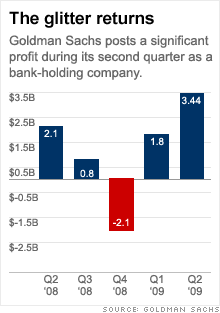Goldman Sachs scores big in latest quarter
Wall Street firm earns $3.4 billion, or $4.93 a share helped by equity underwriting activity; results beat analysts' estimates.

NEW YORK (CNNMoney.com) -- Goldman Sachs proved that it was well on its way towards making a full recovery from last fall's crisis, after its latest quarterly results shattered even the most bullish of expectations on Tuesday.
Just six months after reporting its first loss as a public company, the New York City-based firm delivered its second straight period of better-than-expected results, this time earning $3.44 billion, or $4.93 a share for the second quarter.
Just a year ago, Goldman Sachs reported a profit of $2.1 billion, or $4.58 per share.
"It was a phenomenal quarter all the way around," said Mark Lane, an equity research analyst who tracks Goldman Sachs for at Chicago-based investment firm William Blair & Co.
Helped by a strong performance within the firm's fixed-income and its broader trading business, much of Wall Street was anticipating a blowout quarter from the investment bank, heading into Tuesday's announcement.
Consensus estimates among analysts polled by Thomson Reuters was for net income of $1.73 billion, or $3.54 a share. But the firm managed to blow past even high-end estimates of $4.65 a share.
Still, Wall Street was reluctant to buy on the news after a big run up in the company's stock just a day earlier. Shares of Goldman (GS, Fortune 500) edged higher in midday trading Tuesday.
The good and the bad. Driving much of the firm's latest performance was its fixed income business, which also deals in trading currencies and commodities. Net revenue in the division surged 186% from a year ago to $6.8 billion.
Strong stock issuance activity during the quarter, particularly among some of the nation's top financial firms, also pushed Goldman's equity underwriting business to record revenue levels.
"We did well across a variety of businesses," said David Viniar, Goldman Sachs' chief financial officer. "It was basic blocking-and-tackling for the firm."
Of course, a smaller field of investment bank competitors certainly didn't hurt either, noted Viniar. With Lehman Brothers and Bear Stearns now gone, Goldman Sachs and others have scooped up much of their rivals' former business clientele.
Still, there were pockets of sluggishness for the firm. Traditional investment banking suffered as deal activity languished, as did revenues at Goldman's asset management and securities services businesses.
The firm also said it took a $426 million charge related to its repayment of $10 billion in money received as part of the government's Troubled Asset Relief Program, or TARP.
A bonus boost? Goldman's latest results, which mark its highest level of profitability in more than a year, come at a time when there has been increased scrutiny about the firm's compensation policies, namely its bonuses.
Last month, the Guardian reported that Goldman is on track to pay record bonuses after a stellar performance during the first half of 2009.
Currently, the pool of funds out of which the company pays bonuses stands at $11.36 billion. Were Goldman able to maintain its current performance during the second half of the year, its bonus pool would exceed the lofty levels reached in 2007, when the company spent $20.2 billion on employee salaries and bonuses.
That year, the firm doled out compensation packages that averaged roughly $661,400 for the more than 30,500 workers the firm employed at the time. And with far fewer individuals employed by the company nowadays, the average pay package could be even larger.
Of course, the firm is no longer bound to government compensation restriction after winning its freedom from TARP last month. But it remains to be seen whether the bonuses could raise eyebrows among regulators or the American public.
Viniar noted that there is nothing his firm could do to prevent such a response, instead pointing out that employee compensation rises and falls with the firm's fortunes. If the second half of the year proved tough for the company, he said, pay packages would fall in tandem.
With Goldman's results now public, Wall Street's attention turns towards the rest of the big name financial firms. Peers JPMorgan Chase (JPM, Fortune 500), Citigroup (C, Fortune 500) and Bank of America (BAC, Fortune 500) are both set to deliver results later this week, while Goldman Sachs rival Morgan Stanley (MS, Fortune 500) is set to report next Wednesday. ![]()

